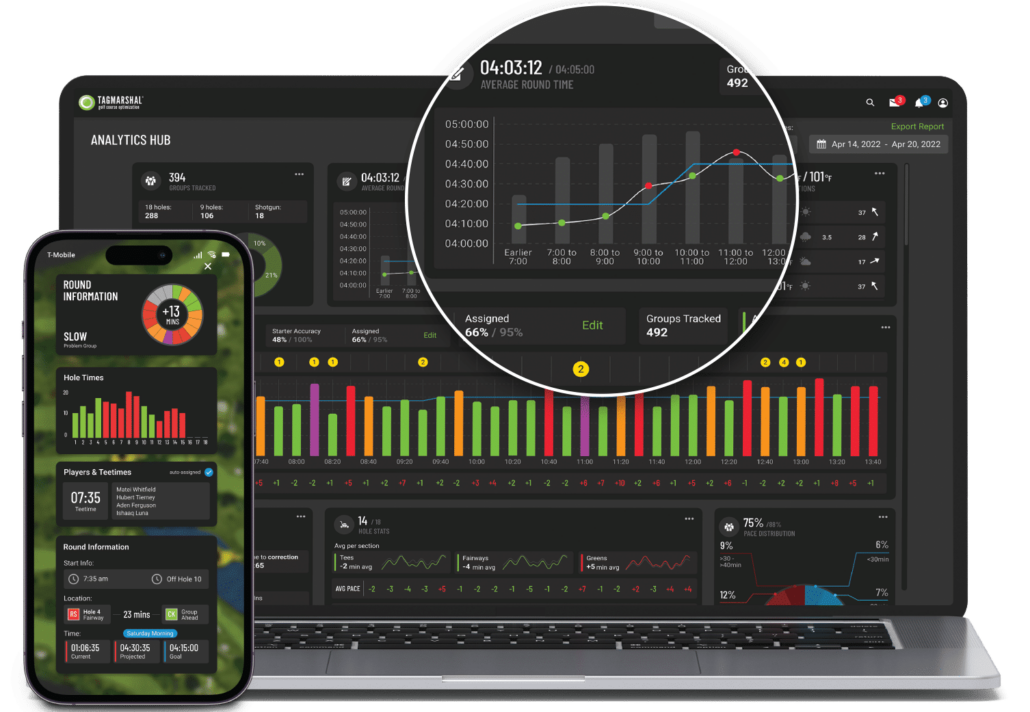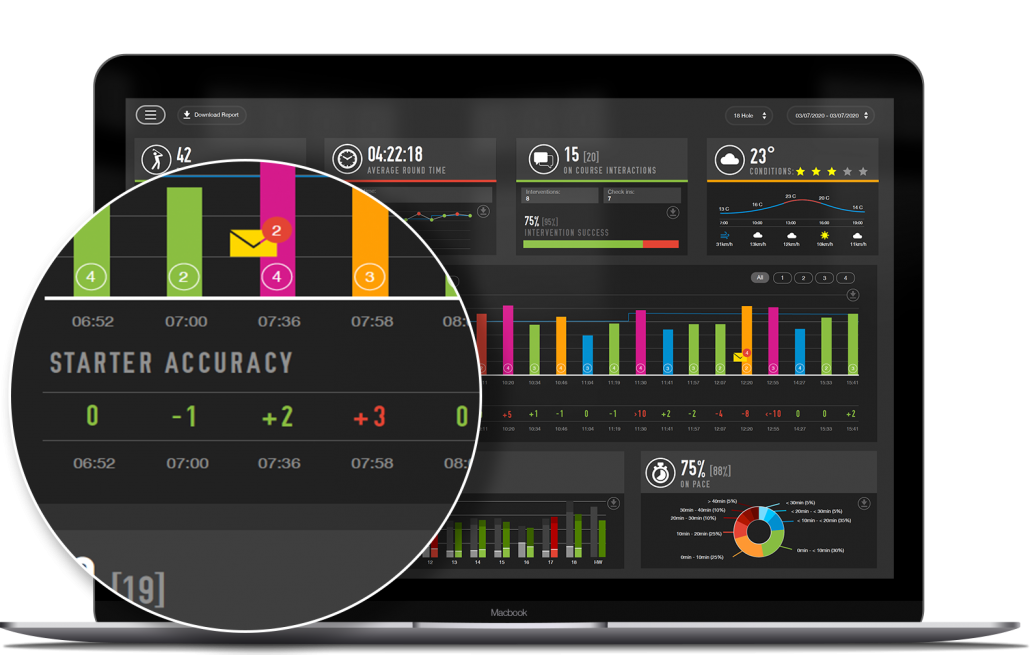5 Data Sets That Will Help You Improve Pace And Flow Of Play
Data has been called ‘the most valuable commodity in the world’ and its importance in effective golf course management cannot be overstated.
Courses that have embraced the increased use of technology will benefit from some operational benefits, but if the data gathered by this technology isn’t captured, a huge opportunity to drive further gains is being missed.
Data helps draw valuable insights, predict trends and guide better decision-making. Let’s look at 5 data sets your course shouldn’t go without.
1. Average Round Time

Pace and flow of play will always remain critical to the overall player experience, so having regularly updated data on this metric is crucial.
Ideally, you want average round times segmented by times of the day and days of the week. You can then identify times that play quicker, which could lead to additional tee sheet capacity.
You can also assign resources to busier, slower periods where they are most needed to ensure pace and flow are maintained.
PRO TIP: Using Tagmarshal’s Analytics Hub, you can set variable goal times for different periods of the day, based on their respective average pace data.
2. Percentage of Rounds on Pace
In the same way that a day’s average temperature masks the highs and lows, your course’s average round time doesn’t accurately tell you how many golfers are actually finishing on pace.
For example, even though you may only be a few minutes above your desired average goal time, this could be skewed by rapid morning rounds. Data may show that most of your rounds are still finishing over pace, negatively impacting the player experience.
Only once you understand your course flow better can you put in place plans to improve it.
PRO TIP: You get a full pace distribution breakdown in the Analytics Hub, illustrating the percentage of rounds that fall into each pace bracket.

“The Analytics Hub is amazing and helps get an accurate, complete picture with data backing this up as opposed to guessing what’s going on.”

3. Starter Accuracy

Measuring starter accuracy is a key aspect of effective pace management, because groups consistently teeing off later than scheduled will have a cumulative effect throughout the day.
Relying on pen-and-paper calculations to measure the full impact this has on your course’s pace and flow of play is time-consuming and often inaccurate.
Once you have a data-based picture of this metric, you can work out which steps are needed to drive improvement. In some cases, additional training may be required for starters and front-of-house staff, or the tweak may be as simple as installing clear signage that players see upon arrival clearly outlining what is expected of them.
Tracking the data across weeks and months means you can set goals for your team to achieve, driving continuous improvement.
PRO TIP: Tagmarshal automatically tracks starter accuracy via the Analytics Hub. The time each group enters the first tee area is measured against their tee sheet starting time.
4. Hole Times
An average round time is valuable, but having that broken down into time spent at each hole offers a far more granular understanding of course flow.
This data allows you to spot opportunities to tweak and optimize hole setups, ensuring a more consistent flow and preventing potential bottleneck areas.
On busier days, you may consider more straightforward pin placements at holes that traditionally play harder, with additional tips and insights on how to play these holes provided.
Ideally, you would also have an understanding of how long groups are waiting on the tee box before they actually hit a ball, which is a major frustration for golfers.
PRO TIP: Via Tagmarshal’s Analytics Hub, you’ll be able to see the exact amount of time groups spend at the halfway house, to gauge whether any changes need to be made.

“I love the hole-by-hole data, which we use to adjust and tweak expectations to make sure that we are setting realistic pace targets for each hole.”

5. Intervention success

Research has shown that pace-based interventions with marshals can make or break the player experience. If these aren’t effective in getting players back into position, then you’re assuming that risk without any potential reward.
Manually logging the time of each intervention, and then measuring whether or not it resulted in a pace improvement, is very labor intensive. By harnessing the power of Tagmarshal’s technology, you can see precisely how successful your interventions have been.
If interventions are regularly ineffective, player assistants may require extra training and your course may need to rethink how it can build a pace of play culture that resonates with golfers.
PRO TIP: Every discussion between golfers and player assistants shouldn’t be centered around pace. Friendly check-ins are a great way to establish trust, which in turn drives up pace compliance.
Conclusion
Optimal decision-making starts with understanding the nuances of how your course operates.
“You can’t improve what you don’t measure,” goes the popular saying, and comprehensive data sets are the ultimate unit of measurement.
Utilizing the full insights that these 5 data sets offer to drive improvement in pace and flow of play will ultimately enhance the player experience, ensuring that members and guests leave your course happy.
ABOUT TAGMARSHAL
Tagmarshal, the market leader in on-course optimization technology, provides courses with full, real-time operational oversight and reporting, giving golf operators the tools to manage pace and flow of play effectively, resulting in enhanced player experiences, increased efficiency through automation, and additional revenue generation.
Tagmarshal’s technology has collected over 10 billion data points from more than 75 million rounds of golf and has relationships with in excess of 700 partners, including Hazeltine, Whistling Straits, Baltusrol, Fieldstone, Bandon Dunes, Serenoa and Erin Hills.
Tagmarshal partners with several golf management groups, private, daily fee, public and resort courses, including 40 of the Top 100 US courses, as well as many $40-$60 green fee courses, which are seeing excellent results using the system.
 WATCH DEMO
WATCH DEMO